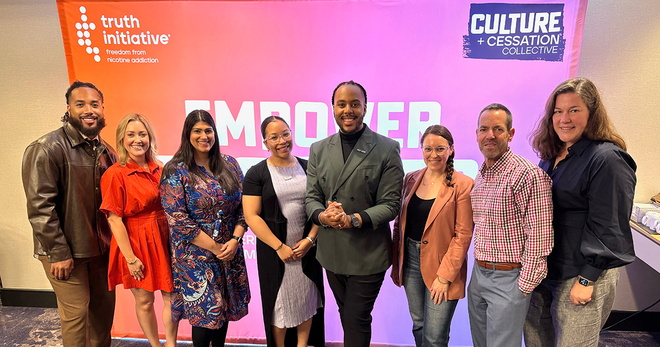Following a decade of impact, the Truth Initiative College Program empowers students, faculty, and staff to quit nicotine
Since 2015, the Truth Initiative College Program has provided funding to over 235 colleges and universities to support the adoption of tobacco/nicotine-free campus policies. Building on a decade of impact, the program continues to provide crucial funding and now supports students, faculty, and staff in quitting nicotine with EX Program, Truth Initiative’s free digital quitting resource.
The Tobacco/Nicotine-free College Program, which offers two-year grants of up to $20,000 to colleges and universities, has also expanded to support implementation and enforcement, as well as adoption, of 100% tobacco/nicotine-free campus policies.
To organize adoption, implementation, and enforcement efforts, college and university grantees select students to serve as Truth Initiative College Leaders, who will engage students, faculty, and staff in discussions about nicotine addiction and raise awareness about the policy. College leaders will also share EX Program’s digital quitting resources – including personalized text messages, quit plans, and the largest online quitting community – which can increase the odds of quitting by up to 40%.
Want support quitting? Join EX Program
By clicking JOIN, you agree to the Terms, Text Message Terms and Privacy Policy.
Msg&Data rates may apply; msgs are automated.
In honor of the College Program’s 10th anniversary, we spoke with current College Leader Arthur Campos Simōes about his experience serving as a College Leader at Columbia University in New York City.
Responses from Misty Terrero and Courtney Butler, College Leaders at the Community College of Aurora and Trinity Washington University, respectively, are also included from previously published interviews. Both institutions have implemented 100% tobacco/vape-free policies.
Why did you join the Tobacco/Nicotine-Free College Program?
Simōes: I guess it was two-fold. One is my family history, so I wanted to make some sort of positive change in my community because of that. But two was the policy part. I thought Columbia University had areas to grow, especially when it came to student representation in the school’s decision making. And I thought that this could be a very good way to help lead change and shape the campus like we want it to be.
Butler: I heard of Truth Initiative a long time ago with those commercials. I feel like everyone has seen those commercials. That was my first foot in the door. But I didn’t get the opportunity to be a College Leader until one of my professors brought it to me that Trinity had gotten the grant and wanted me to be a part of it, and I was like, “Yeah, let’s do it, why not?”
What does engaging a campus community look like?
Simōes: At Columbia, we have a University Senate, which is the main legislating body of the university, so we tried to understand what we had to do in order to get this policy formalized. We gathered as much stakeholder feedback as possible and circulated a form among the student body. We had key informant interviews with university senators, facility staff, and senior administrators. They voiced their concerns to us about what they think policy should be like, and what it currently is. We started to get a sense of what we had to do.
Terrero: We hosted “Move It Tobacco,” an event based on the suggestion to exercise to avoid the urge to smoke. Because if you’re sitting there with this idea of, “I want to smoke, I’m stressed,” moving around can help fight that urge. And then we hosted a breakfast because those who tend to smoke may not get enough nutrition, considering that nicotine reduces your appetite.
Butler: When we had a screening of the documentary “Black Lives / Black Lungs” at Trinity, that was my first public speaking event. We had a presentation and a panel discussion, and we had a walkthrough exhibit called “Menthol by the Decades.” That got everyone’s attention because it was posterboards, pictures, documents, excerpts from the Master Settlement Agreement. Because even students who might not necessarily smoke cigarettes or vape, they know someone who does, and they can carry that information like I carry it with me.
What is one thing you’ve learned from your work as a College Leader?
Terrero: From firsthand experience, I can see the correlation of substance use, such as smoking, and mental health. It's not a topic that’s easy to approach, especially coming from a Latinx household. So being an advocate for this program, I've been able to really communicate with students, “I know where you come from. I know your parents might not feel comfortable having this conversation. But really, this is impacting you just as much as it's impacting them.”
Simōes: One is how to engage with different stakeholders and just talking to people. And two, it’s given me a very good reason to engage more with Columbia’s institutional policy and see how things get done at an institutional level, when you have over 40,000 students, faculty, and staff who have to follow a set of bylaws.
Butler: We went to Capitol Hill. That was something I had never thought I would be able to do. To me, activism was standing on the corner with a sign and some merchandise and saying, “Hey, this is our cause, come support, come out.” That was my little idea of activism. But now it’s “You can go talk to decision makers.”
For questions or inquiries about the Truth Initiative Tobacco/Nicotine-Free College Program, please email Kristen Tertzakian at [email protected].
More in tobacco prevention efforts
Want support quitting? Join EX Program
By clicking JOIN, you agree to the Terms, Text Message Terms and Privacy Policy.
Msg&Data rates may apply; msgs are automated.


